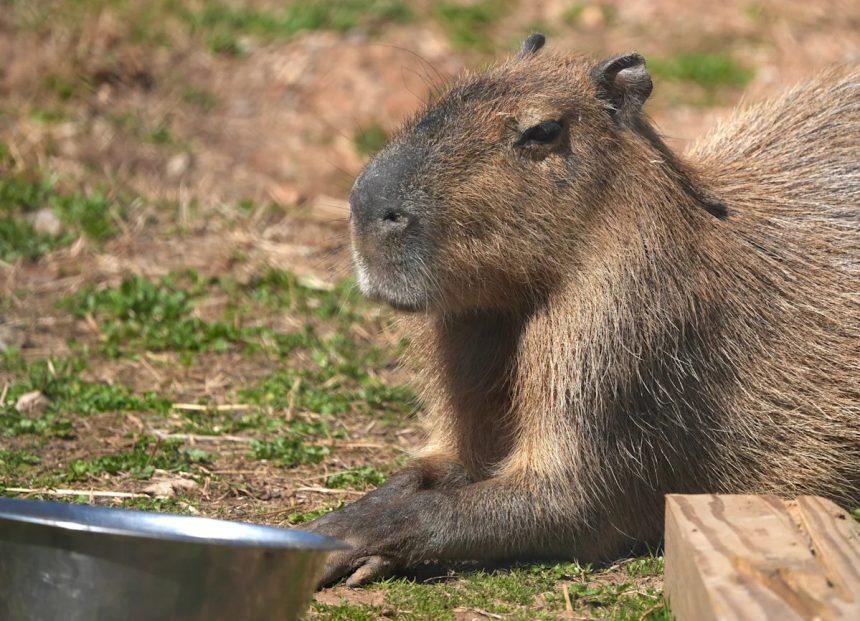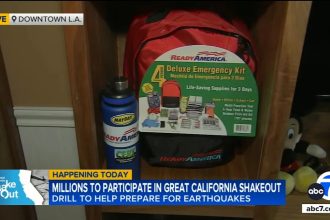A Kentucky capybara recently caused controversy when visitors of a state renaissance fair wondered if the rodent was receiving proper care thanks to a viral photo, leading to attention from an animal welfare agency and even questions for the Louisville Zoo.
Gilbert, a young female capybara, was part of a booth at the 2025 Ohio Renaissance Festival in Waynesville, Ohio, promoting “Gilbert the Cranky Capybara Makes a Friend,” a children’s book by Louisville-based Line by Lion Publications. After a photo of Gilbert showing her inside a crate began to spread online, people reported the vendor to local law enforcement, prompting an evaluation by Warren County Animal Control.
The agency later stated the animal was in good health, stress-free and receiving appropriate care from her handlers.
According to a report from the Cincinnati Enquirer, online discourse about the situation included a comment that Gilbert was under the veterinary care of the Louisville Zoo, which employees have since denied.
“Louisville Zoo veterinarians are not caring for or working with this capybara,” Louisville Zoo spokesperson Kyle Shepherd said in a statement.
Officials from Line by Lion Publications also took to Facebook to dispel the rumors and clarify that Gilbert is in good care.
“I would very much like this to be the end of this discussion, so we can go back to doing what we do best — taking care of our loved ones of all species and creating amazing fiction,” the post stated.
The larger conversation about caring for capybaras sparks some legal questions about the exotic animal. Here’s what to know about owning exotic animals in Kentucky:
Can you keep capybaras as pets in Kentucky?
A Capybara, one of the World´s largest rodents is a part of Kentucky Down Under Adventure Zoo. March 25, 2025
Capybaras, the world’s largest rodent, are native to South America, but the animal is not on the Kentucky Department of Fish and Wildlife Resources’ list of prohibited species, which include environmentally injurious or inherently dangerous animals such as jackrabbits.
“I do not see capybara on the list of prohibited exotic wildlife, but any native or exotic wildlife would still be required to obtain proper transportation permits into or through Kentucky,” Kentucky Department of Fish and Wildlife Resources spokesperson Lisa Jackson told The Courier Journal via email.
Since the capybara is not a prohibited species, all Kentuckians have to do to own the large rodent as a pet is to get the proper license through the Kentucky Department of Fish and Wildlife Resources, as long as they first check local ordinances to make sure the animal is allowed in their community.
Permits are invalid unless they are accompanied by a certificate of veterinary inspection from an accredited veterinarian indicating that the animal is free of disease.
How do I get a wildlife permit in Kentucky?
Anyone planning to bring an exotic animal into Kentucky is required to have transportation permit.
Kentuckians aged 18 or older are able to apply as long as they pay an application fee, provide their personal identification information and describe the animal they would like to bring into the commonwealth, including the purpose for importing the animal and where it came from.
One type of permit offered on the state website is an individual transportation permit application. The individual permit, which requires a $25 fee per shipment, is valid for a range of dates authorized once issued.
The other kind is an annual transportation permit application. After a $250 fee, granted permits covers all shipments of wildlife at the approved locations for a period of one year and is appropriate for people in professions that relate to wildlife, such as wildlife rehabilitation or scientific research.
For any additional questions, contact the Kentucky Department of Fish and Wildlife Resources or your city’s metro council for information.
Where can capybaras be seen in Kentucky?
For capybara lovers who may not be quite ready to own an exotic pet, the following are places to visit them in the commonwealth.
-
Little Crooked Creek Safari in Lawrenceburg, 1430 Little Crooked Creek Road. The Shelby County petting zoo provides an opportunity to see two capybaras, Coco and Pepper, while also housing a sloth, anteater and a baby zebra.
-
Wendt’s Wildlife Adventure in Carlisle, 3740 Maysville Road. The wildlife park in Nicholas County, Kentucky is home to more than 35 species, according to its website, including a camel, emu and red kangaroo. Wendt’s has an animal experience to meet the park’s sloths and capybaras up close.
This article originally appeared on Louisville Courier Journal: Kentucky capybara sparks concern following Ohio Renaissance Fair









